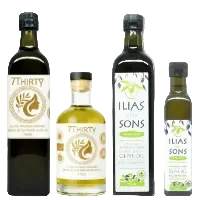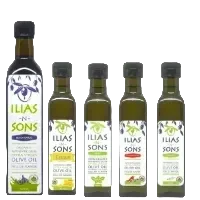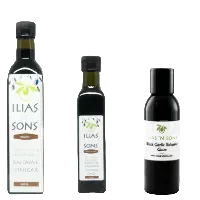Menu
-
-
NEW
- Olive Oils & Balsamic
- Greek Honey
- Pantry
- Health Hub
- Reviews & Testimonials
-
Discover
-
- Login

Olive Oils & Balsamic
- Black Garlic Infused Extra Virgin Olive Oil - Low Fodmap
- Garlic Infused Extra Virgin Olive Oil
- Pizza Oil Cayenne Pepper Infused Extra Virgin Olive Oil
- Smoked Infused Extra Virgin Olive Oil
- Rosemary Infused Extra Virgin Olive Oil
- Lemon Infused Extra Virgin Olive Oil
- Black Truffle Extra Virgin Olive Oil
- Flavour your own Gourmet Extra Virgin Olive Oil Infusion


- Black Garlic Infused Extra Virgin Olive Oil - Low Fodmap
- Garlic Infused Extra Virgin Olive Oil
- Pizza Oil Cayenne Pepper Infused Extra Virgin Olive Oil
- Smoked Infused Extra Virgin Olive Oil
- Rosemary Infused Extra Virgin Olive Oil
- Lemon Infused Extra Virgin Olive Oil
- Black Truffle Extra Virgin Olive Oil
- Flavour your own Gourmet Extra Virgin Olive Oil Infusion

THE CORRUPTION OF THE OLIVE INDUSTRY
September 24, 2018 3 min read
The past: Tale as old as time
“Fake” is all the rage at the present: fake news, fake views and so on. And now, perhaps you should get familiar with fake olive oil. Are you sure that the bottle of extra virgin olive oil (EVOO), labeled by a big producer, in your kitchen is really what it is boasted to be? That is, if the bottle contains actual olive oil and nothing else. For the skepticism, you should know that fake olive oil is a long-standing phenomenon, dating back to the Romanian time. The fat liquid was extremely popular in the glorious civilization, in which per-capita consumption of olive oil was estimated to by fifty liters every year. Mercenary traders were known to mix high-quality olive oil with cheaper substances like lard, and then sold them for exorbitant price. In the modern era when olive oil has made an impressive comeback, partly thanks for the rise of Mediterranean diet, it is inevitable that oil fraud has also returned.
The most notable case was arguably that of Domenico Ribatti, the world's largest olive oil dealer back in the 1990s. His career, however, ended most dishonorably when he was given a 13-month prison sentence for passing off refined Turkish hazelnut oil as olive oil. Even in the 20th century when olive oil consumption didn’t explode yet, producing fraudulent olive oil was already a multi-billion business, leaving an indelible mark on pop culture. For example, the character Vito Corleone of the massively famous Godfather trilogy was based on a real-life olive oil mafioso named Joe Profaci. “Profits [of fraud olive oil production] were comparable to cocaine trafficking, with none of the risks,” one EU anti-fraud investigator said nearly two decades ago, summing up neatly why it was and would ever be difficult to find authentic olive oil.
The present: The scam is on
Dcoop, Spain’s largest olive oil cooperative, is a household name in the olive oil industry. It sold more than 30,000 tons of olive oil last year and currently accounts for about 17 percent of the Spanish olive oil market in the U.S. It is famed not only for the sheer market share but also for its very competitive price that is always 40 % lower than other brands. Everything is perfect except for one tiny hiccup: Its prized EVOO is not olive oil at all.
Dcoop is now in hot water after Spanish authorities found out in July that 99 % of what it advertised as EVOO was in fact Canadian rapeseed oil. Needless to say, the finding incited angry reactions from food regulators and consumers who can possibly have been taken for a ride for years. The fallout of the scandal will take some time to be fully known, but one thing is immediately certain: Consumer mistrust of industrial olive oil producers has increased after this incident, which is the latest in a series of olive oil scams.
In 2016, the renowned American television program 60 Minutes uncovered a dark secret that affected millions of consumers: 80 % of the Italian olive oil on the shelves of US supermarkets was fraudulent. Another revelation was that Italy's olive oil business had been corrupted by the mafia who saw huge profits in faking the golden liquid, leading to the influx of inferior olive oil export that was marketed as “extra virgin”, with the US being the most popular destination. The evil influence even spread to well-known brand names whose “EVOO” products might be merely sunflower oil added with chlorophyll and beta-carotene to have the color and aroma of the real thing. So next time you pick up an elaborately-designed olive oil bottle labeled as “extra virgin” in the supermarket, be prepared for the opposite. But does it have to be that way?
The future: Return to the roots
Mass commercialization has compromised the quality of EVOO, but individual farms around the world have strived to uphold the great quality standard established millenniums ago, especially in Greece, the cradle of olive oil. If you are seeking true olive oil trusted by kings and queens of old, the golden liquid that enhances health and increases longevity, catchy names in big supermarkets are not the best place to start your search. Let’s turn your eyes to companies that have their own farms, ensuring that they will import quality olive oil from reliable sources with neither corporate greed nor criminal influence in between. Have no faith in the big names, but rather rest your hope in the emerald orchards of olive trees that do not tell mechanical lies.
SOURCES
https://www.theguardian.com/lifeandstyle/wordofmouth/2012/jan/04/olive-oil-food-fraud
https://www.newyorker.com/magazine/2007/08/13/slippery-business
https://www.oliveoiltimes.com/olive-oil-business/dcoop-pompeian-under-fire-for-deceptive-labeling/64058
https://www.forbes.com/sites/ceciliarodriguez/2016/02/10/the-olive-oil-scam-if-80-is-fake-why-do-you-keep-buying-it/#1c9346b7639d
https://www.cbsnews.com/news/60-minutes-overtime-how-to-buy-olive-oil/
Leave a comment
Comments will be approved before showing up.